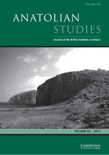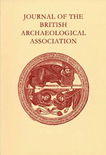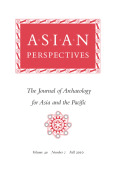
Spal
metrics 2024
Elevating Scholarship in Archaeology and History.
Introduction
Spal is a distinguished academic journal dedicated to the fields of Archaeology and History, published by the University of Seville, Editorial. With an ISSN of 1133-4525 and an E-ISSN of 2255-3924, it has established a prominent reputation within the scholarly community, currently enjoying an impressive Q1 ranking in Archeology (Arts and Humanities) and History, alongside a Q2 ranking in Archeology for 2023. The journal serves as a critical platform for researchers, professionals, and students alike, promoting the dissemination of cutting-edge research and innovative methodologies in these vital disciplines. Spal's Scopus Ranks place it in the 84th percentile for Arts and Humanities - History and the 72nd for Archeology within the field, emphasizing its impact and relevance in contemporary scholarship. Although it operates under a traditional access model, its commitment to advancing knowledge and discourse in archaeological and historical studies remains unwavering. The journal's coverage spans from 2015 to 2024, positioning it well to contribute to ongoing academic conversations and foster collaborations within the global research community.
Metrics 2024
 0.36
0.36 0.60
0.60 0.50
0.50 8
8Metrics History
Rank 2024
Scopus
JCI (Web Of Science)
Quartile History
Similar Journals

Anatolian Studies
Pioneering Research in the Heart of AnatoliaAnatolian Studies, published by Cambridge University Press, stands as a premier forum for research in the fields of archaeology, cultural studies, and history. Established in 1951, this esteemed journal has consistently contributed to the academic discourse surrounding the rich and multifaceted history of Anatolia, earning its place in the Q1 category across multiple disciplines. With a notable impact factor reflected in its Scopus rankings, it ranks among the top journals in its fields: 78th in History, 155th in Cultural Studies, and 55th in Archaeology, showcasing its significant influence and recognition. This journal serves as an invaluable resource for researchers and scholars seeking to delve into the intricacies of Anatolian heritage, providing a platform for innovative research and critical discussion within the academic community. While it currently does not offer open access, Anatolian Studies continues to enrich scholarly resources and advance knowledge within its key areas of focus.

Annales Instituti Archaeologici
Fostering Scholarly Dialogue in the Archaeological CommunityAnnales Instituti Archaeologici is a distinguished journal published by INST ARHEOLOGIJU, dedicated to advancing research in the field of archaeology. With an ISSN of 1845-4046 and an E-ISSN of 1848-6363, this journal serves as a vital platform for the dissemination of innovative archaeological studies and findings, reflecting the evolving trends and methodologies in this fascinating discipline. Based in Croatia, the journal captures a global audience, emphasized by its Q3 ranking in both Archaeology categories as per the latest 2023 metrics, indicating a solid presence in the academic landscape. Although it does not currently offer Open Access options, its impactful contributions are recognized through its Scopus ranks, where it stands at #137/413 in Archaeology related to Arts and Humanities and #135/354 in Social Sciences. Researchers, professionals, and students interested in the latest archaeological research and its applications will find Annales Instituti Archaeologici to be an invaluable resource, promoting knowledge and fostering scholarly communication within the archaeological community.

Journal of the British Archaeological Association
Connecting Scholars to Britain's Archaeological NarrativeJournal of the British Archaeological Association is a prestigious publication in the field of archaeology, dedicated to fostering scholarly dialogue and advancing research related to Britain's rich archaeological heritage. Published by Routledge Journals, Taylor & Francis Ltd, this journal serves as a vital platform for researchers, professionals, and students alike, offering insights into archaeological practices and findings from the United Kingdom and beyond. With an ISSN of 0068-1288 and an E-ISSN of 1747-6704, the journal has a notable history spanning from 1980 to the present, contributing significantly to the academic community. Currently categorized within Quartile 4 for archaeology and visual arts, it serves as a resource for emerging researchers while promoting innovative perspectives in archaeology. Although it operates under a traditional subscription access model, the quality and depth of content delve into significant archaeological discussions, making it an essential read for those seeking to broaden their understanding of archaeological methodologies and theories. The association's commitment to preserving and interpreting archaeological data ensures that the Journal of the British Archaeological Association remains an indispensable resource for anyone passionate about uncovering the past.

Azania-Archaeological Research in Africa
Exploring the Depths of Africa's Past.Azania-Archaeological Research in Africa, published by Routledge Journals, Taylor & Francis Ltd, stands as a premier academic resource in the field of archaeology, specifically focusing on African archaeological research. With a remarkable tradition dating back to 1966, the journal spans over half a century of rigorous scholarship, aiming to enrich our understanding of Africa's diverse cultural and historical narratives. Currently indexed in the prestigious Q1 category for both Archaeology and Arts and Humanities, it ranks impressively in the Scopus database, placing within the top 12% of journals in its field. This commitment to excellence facilitates the dissemination of innovative and insightful research, catering to a broad audience of researchers, professionals, and students alike. While the journal is not open access, its impactful contributions continue to shape contemporary archaeological discourse, making it an essential resource for anyone passionate about the study of Africa's archaeological heritage.

Archaeologia Maritima Mediterranea-An International Journal on Underwater Archaeology
Unveiling the Secrets Beneath the WavesArchaeologia Maritima Mediterranea is a prestigious international journal focused on the vital field of underwater archaeology, published by FABRIZIO SERRA EDITORE. With an ISSN of 1724-6091 and E-ISSN 1825-3881, this journal has been a cornerstone for scholars and enthusiasts alike in the study of maritime cultures, shipwrecks, and submerged sites around the Mediterranean region since its inception. Operating from its base in Pisa, Italy, the journal has a commendable academic presence, reflected in its recent Scopus rankings which place it in the lower quartiles in both Arts and Humanities, and Social Sciences subcategories within archaeology. Despite its current Q4 categorization, it serves as an important platform for emerging research and advancements in the field, aiming to foster collaboration and knowledge exchange amongst researchers, practitioners, and students. While the journal is accessible through traditional subscription models, the lack of open access emphasizes the publisher's commitment to maintaining high academic standards. The collection of issues from 2011 to 2023 showcases a rich tapestry of research that contributes significantly to our understanding of underwater cultural heritage.

Stratum Plus
Advancing Knowledge in Anthropology, Archeology, and HistoryStratum Plus, published by HIGH ANTHROPOLOGICAL SCH UNIV, is a distinguished academic journal based in Moldova that focuses on the fields of Anthropology, Archeology, and History. With an impressive impact factor reflecting its stature—ranked in the Q2 category for both Anthropology and Archeology, and Q1 for Archeology in the arts and humanities—this journal is a vital resource for scholars, professionals, and students alike. The journal's comprehensive scope encompasses a wide array of interdisciplinary studies, making it a beacon for innovative research and critical discourse within these disciplines. Since its inception in 2014, Stratum Plus has strived to foster academic excellence and knowledge dissemination, thus playing a crucial role in shaping contemporary anthropological and archaeological thought. While currently not available as Open Access, the journal maintains a strong online presence, with access options available through institutional subscriptions. Located at ZIMBRULUI 10A ST, KISHINEV MD-2024, MOLDOVA, Stratum Plus invites contributors and readers to engage with cutting-edge research that continues to enrich the global academic community.

Bulletin of the American Society of Overseas Research
Fostering interdisciplinary insights into archaeology and cultural narratives.Bulletin of the American Society of Overseas Research, published by the University of Chicago Press, serves as a premier platform for scholarly discourse in the fields of archaeology, cultural studies, and history. With its ISSN 2769-3600 and E-ISSN 2769-3589, this journal has swiftly established itself as a key resource for researchers, professionals, and students alike, demonstrating exceptional impact as evidenced by its Q1 rankings in multiple relevant categories for 2023. Notably, it holds the 93rd percentile rank in Arts and Humanities (History) and the 84th percentile in Social Sciences (Cultural Studies), evidencing its respected standing within the academic community. The journal's commitment to advancing knowledge and fostering interdisciplinary dialogue is complemented by its accessible publication from 2022 to 2024, making it an essential read for those engaged in the exploration of global cultural histories and archaeological research.

Ancient Asia-Journal of the Society of South Asian Archaeology
Fostering Interdisciplinary Insights into South Asian ArchaeologyAncient Asia - Journal of the Society of South Asian Archaeology, published by ARF India, stands as a pivotal resource for the exploration and dissemination of archaeological research focused on the rich history and culture of South Asia. Since its inception as an Open Access journal in 2006, it has become an essential platform for scholars and enthusiasts alike, boasting an impressive range of quartile rankings across multiple disciplines, including Anthropology, Archaeology, History, and Visual Arts. With expansion into various indexed categories and consistent dissemination of impactful research common to this highly diverse field, Ancient Asia aims to foster interdisciplinary dialogue, facilitate collaboration among researchers, and enhance the global understanding of ancient civilizations within the region. By embracing an inclusive access model, the journal encourages wide readership and engagement, positioning itself as a key player for students, professionals, and academics interested in delving into the archaeological marvels of South Asia.

Asian Perspectives-The Journal of Archaeology for Asia and the Pacific
Illuminating Cultures: A Journey through Time and SpaceAsian Perspectives - The Journal of Archaeology for Asia and the Pacific is a prestigious journal published by University of Hawaii Press, focusing on the intricate field of archaeology in Asia and the Pacific. With a rich publication history dating back to 1993, the journal has established itself as a vital platform for disseminating research that illuminates the archaeological heritage and cultural dynamics of this diverse region. Recognized for its scholarly impact, it enjoys a commendable impact factor and ranks in the Q2 category for Anthropology and Archaeology, indicating its significant contribution to these fields. Although it operates on a traditional subscription-based model, the journal is accessible to institutional and individual subscribers worldwide. With an emphasis on interdisciplinary research, Asian Perspectives invites contributions that foster a deeper understanding of historical and contemporary issues through archaeology, making it an invaluable resource for researchers, professionals, and students alike committed to advancing scholarly dialogue in the region. Explore a wealth of innovative studies and insights that continue to shape the understanding of Asia and the Pacific's archaeological narrative.

Lucentum
Exploring the Depths of Our HeritageLucentum is a distinguished open-access journal published by Universidad de Alicante, focusing on the interdisciplinary fields of Archeology, History, and Paleontology. Since its inception in 1982, it has established itself as a vital platform for scholars and researchers to disseminate their findings, contributing significantly to the academic landscape in Spain and beyond. The journal's notable rankings, including Q1 status in History and Q2 in Archeology, reflect its commitment to high-quality scholarship and rigorous peer review. With an impressive impact factor and recognition in Scopus, Lucentum serves as an essential resource for professionals, students, and historians, fostering a deeper understanding of cultural and historical contexts through a wealth of interdisciplinary research. The journal continues to embrace open access, ensuring that critical knowledge is freely available to the global research community.